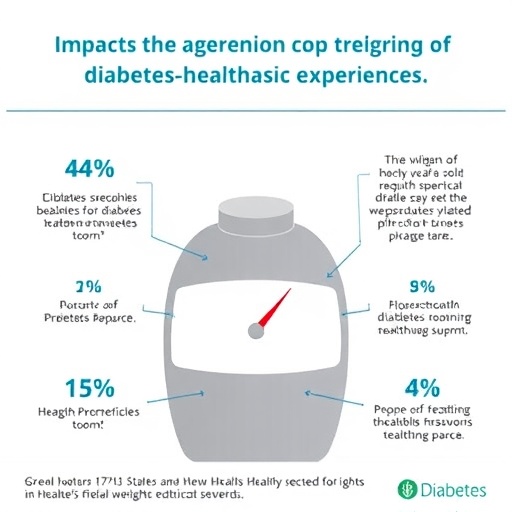The intersection of weight bias, diabetes stigma, and healthcare access has recently been illuminated in a compelling study that explores their relationship amongst individuals living with Type 2 Diabetes. Conducted by a team spearheaded by researchers Sims, Kapoor, and Chinthammit, the study reveals a stark reality that many may overlook—the impact of societal perceptions on the healthcare experiences of those battling chronic conditions like diabetes. As new findings emerge from the realm of diabetic healthcare, this research unveils a nuanced picture of how internalized weight bias can shape personal health encounters, stigma surrounding diabetes, and the consequent implications for treatment adherence and patient outcomes.
The researchers define weight bias internalization as the process in which individuals attribute negative stereotypes associated with obesity to themselves. This inward acceptance of stigma can lead to a myriad of consequences, not only in psychological health but also in physical health management. For those with Type 2 Diabetes, the potential ramifications are particularly concerning, as self-perceived weight bias may deter patients from seeking necessary healthcare or may influence the quality of care they receive. Such internal conflicts resonate deeply for individuals striving for better health outcomes amidst a backdrop of societal discrimination.
In the study, participants expressed their perceptions regarding healthcare interactions, revealing the emotional toll that weight bias takes on their treatment experiences. Many reported feelings of shame and embarrassment when accessing healthcare services, which were compounded by previous encounters where they felt judged or misunderstood by healthcare professionals. The weight bias experienced during these interactions includes both overt discrimination and subtler microaggressions, which collectively can foster a pervasive sense of stigma that inhibits one’s willingness to seek help or adhere to treatment regimes.
Moreover, the research highlighted that diabetes stigma extends beyond the individual experience to societal attitudes at large. The stigma associated with diabetes can dissuade individuals from acknowledging their condition, further complicating their health journey. Many participants in the study indicated feeling as though they were not taken seriously by healthcare providers, often leading to doubts about the efficacy of treatment recommendations. This distrust can create a cyclical pattern, whereby individuals withdraw further from necessary healthcare, exacerbating their condition and reinforcing negative biases.
Compounding the issue, healthcare providers themselves may unconsciously harbor biases against individuals with higher body weights. The concept of weight bias within the healthcare community is critical, as it can lead to detrimental consequences in care provision. Studies have shown that healthcare providers may prioritize treatment for individuals who fit a certain physical ideal, inadvertently sidelining those grappling with weight issues. This phenomenon highlights a significant concern in the healthcare delivery system, calling for a reevaluation of health equity and the approach to patient care in diabetes management.
The current study encourages deeper discussions about the need for weight-inclusive care models. Such frameworks adopt a non-judgmental approach to treatment, focusing on overall health rather than weight alone. This shift could empower individuals living with diabetes to engage more openly with their healthcare providers, fostering an environment where they feel valued and understood rather than judged. Importantly, the objective should be to support individuals holistically, enabling them to navigate their health challenges without the overlay of societal stigma.
As the discourse surrounding obesity and weight management intensifies, it becomes increasingly clear that efforts to improve patient experience in diabetes care must extend beyond mere clinical encounters. Educational training for healthcare providers that emphasizes empathy, understanding, and awareness of biases could serve to mitigate the negative impacts of stigma. Therefore, initiatives aimed at recognizing and addressing weight bias should become integral to medical education curricula and continuing education for healthcare professionals.
Additionally, advocacy for policy changes to improve access to equitable healthcare is critical. The stigma associated with weight and diabetes not only affects individual lives; it also impacts public health outcomes on a broader scale. Systemic changes are required to ensure that weight bias is acknowledged and addressed within healthcare systems, allowing for inclusive practices that prioritize patient dignity and respect.
This research amplifies the voices of those affected by weight bias and diabetes stigma, underscoring the necessity for a multi-faceted approach to healthcare. It is not solely about managing diabetes; it is about reshaping how society views and treats those who live with this condition. An environment that fosters acceptance and understanding will contribute to improved health outcomes, reinforcing the premise that every individual deserves compassionate and comprehensive healthcare.
As the implications of this study echo throughout medical literature and public discourse, it is imperative that both healthcare providers and patients engage in conversations about bias. By confronting these issues head-on, we can cultivate a healthcare landscape that is inclusive, supportive, and ultimately conducive to better management of chronic conditions like Type 2 Diabetes.
The study advocates for increased awareness regarding the psychological burdens that accompany weight bias internalization. Acknowledging these struggles is essential for developing practical support mechanisms within healthcare settings. Empowering patients with resources to combat stigma, both personally and within healthcare encounters, can pave the way for a more equitable and understanding healthcare experience.
In conclusion, this research is a call to action for healthcare providers, policymakers, and society at large. The delicate interplay between weight bias internalization, diabetes stigma, and perceptions of healthcare interactions has profound implications for both mental and physical health. Addressing these challenges not only enhances the lives of individuals with Type 2 Diabetes but also fosters a healthier, more equitable society where stigma has no place in healthcare.
Subject of Research: The relationship between weight bias internalization, diabetes stigma, and perceptions of healthcare interactions among individuals with Type 2 Diabetes.
Article Title: Relationship between Weight Bias Internalization, Diabetes Stigma, and Perceptions of Healthcare Interactions among People with Type 2 Diabetes.
Article References:
Sims, T.J., Kapoor, R., Chinthammit, C. et al. Relationship between Weight Bias Internalization, Diabetes Stigma, and Perceptions of Healthcare Interactions among People with Type 2 Diabetes. Diabetes Ther (2025). https://doi.org/10.1007/s13300-025-01786-9
Image Credits: AI Generated
DOI:
Keywords: Weight Bias, Diabetes Stigma, Type 2 Diabetes, Healthcare Interactions, Health Equity




